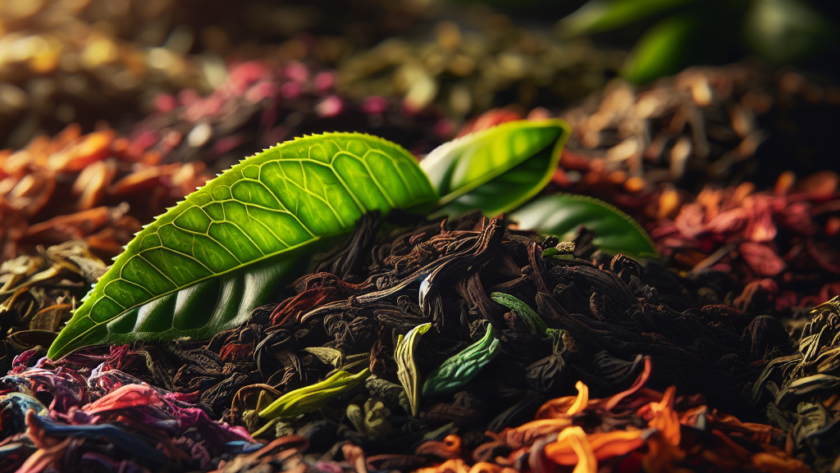Looking for a natural pick-me-up? Look no further than a cup of delicious tea! In this article, we will explore the wonderful world of mood-boosting teas. Whether you’re feeling down, stressed, or simply in need of a little positivity, there’s a tea out there for you. From soothing chamomile to invigorating green tea, these herbal infusions have the power to uplift your spirits and bring a sense of calm to your day. So sit back, relax, and let’s dive into the different types of teas that can help boost your mood!
Benefits of Tea for Boosting Mood
Introduction
Tea has long been celebrated for its numerous health benefits, from boosting metabolism to improving heart health. However, did you know that tea can also have a profound impact on your mood? In this article, we will explore the effects of various types of tea on mood enhancement, providing you with a comprehensive guide to incorporating tea into your daily routine. Whether you’re a fan of green tea or prefer the soothing properties of chamomile, there’s a tea out there to suit your taste and boost your mood.
Effects of Tea on Mood
Before delving into the specific types of tea, it’s important to understand how tea can affect your mood. Many teas contain bioactive compounds that have been found to stimulate the production of neurotransmitters such as serotonin and dopamine, which are responsible for feelings of happiness and pleasure. Additionally, the ritual of making and enjoying a cup of tea can in itself provide a sense of relaxation and tranquility. So, whether you need a pick-me-up or a moment of calm, turning to tea may be just what you need.
Tea as an Alternative to Coffee
While coffee is known for its ability to provide an energy boost, it may also lead to jitters and increased anxiety in some individuals. Tea, on the other hand, offers a gentler and more balanced approach to enhancing mood and energy levels. Additionally, tea contains less caffeine than coffee, making it a suitable alternative for those who are sensitive to the stimulant. So, if you’re looking for a natural and soothing way to boost your mood without the negative side effects of coffee, turning to tea may be the perfect solution.
1. Green Tea
Overview of Green Tea
Green tea, derived from the leaves of the Camellia sinensis plant, has long been revered for its numerous health benefits. It is rich in antioxidants and contains various bioactive compounds that contribute to its mood-enhancing properties.
Catechins and L-Theanine in Green Tea
One of the key components of green tea that contributes to its mood-boosting effects is a group of antioxidants known as catechins. These powerful compounds have been found to have neuroprotective properties, promoting brain health and enhancing mood. Additionally, green tea is a natural source of L-theanine, an amino acid that increases the production of serotonin and dopamine, promoting a sense of calm and happiness.
Effects of Green Tea on Mood
Research has shown that regularly consuming green tea can have a positive impact on mood and mental well-being. Studies have found that the antioxidants and bioactive compounds in green tea can help reduce symptoms of depression and anxiety, improving overall mood and cognitive function. Moreover, the combination of caffeine and L-theanine in green tea can provide a gentle energy boost without the jitters often associated with coffee.
Best Time to Drink Green Tea
To fully reap the mood-boosting benefits of green tea, it is recommended to consume it in the morning or early afternoon. Green tea contains caffeine, albeit in smaller amounts than coffee, which can provide an energy boost. However, consuming it later in the day may interfere with sleep, so it’s best to enjoy green tea earlier in the day for optimal mood enhancement.
2. Chamomile Tea
Overview of Chamomile Tea
Chamomile tea, derived from the dried flowers of the chamomile plant, is renowned for its calming and soothing properties. It has been used for centuries as a natural remedy for various ailments, including anxiety and insomnia.
Benefits of Chamomile Tea for Mood
Chamomile tea contains various compounds that contribute to its mood-enhancing effects. It is rich in flavonoids, which have been shown to have anti-inflammatory and antioxidant properties, promoting a sense of calm and relaxation. Additionally, chamomile tea contains apigenin, a compound that binds to specific receptors in the brain, reducing anxiety and promoting sleep.
Calming Effects of Chamomile
Drinking chamomile tea can have a profoundly calming effect on both the mind and body. It helps reduce anxiety and stress, allowing you to unwind and relax after a long day. The gentle aroma and warmth of chamomile tea can create a soothing atmosphere, providing a tranquil and peaceful experience.
Considerations for Consuming Chamomile Tea
While chamomile tea is generally safe for consumption, it’s important to note that some individuals may have allergies or sensitivities to chamomile. If you experience any adverse reactions such as itching or swelling, it is advisable to discontinue use. Additionally, if you are taking any medications or have pre-existing medical conditions, it’s always best to consult with your healthcare provider before incorporating chamomile tea into your routine.
3. Peppermint Tea
Overview of Peppermint Tea
Peppermint tea, made from the leaves of the peppermint plant, is known for its refreshing and invigorating aroma. It has a cooling effect on the body and contains several active compounds that contribute to its mood-enhancing properties.
Peppermint Tea and Mood Enhancement
The natural menthol present in peppermint tea has been found to have mood-enhancing effects. It stimulates the production of neurotransmitters like serotonin, promoting feelings of happiness and well-being. Additionally, the strong aroma of peppermint can help alleviate mental fatigue and enhance focus, leaving you feeling refreshed and revitalized.
Effects on Digestion and Stress
Peppermint tea has also been associated with improved digestion, which can indirectly affect mood. When the digestive system functions optimally, the body absorbs essential nutrients more effectively, supporting overall well-being and mood stability. Furthermore, peppermint tea’s ability to relieve symptoms of indigestion, such as bloating and stomach discomfort, can help reduce stress and enhance mood.
Precautions for Drinking Peppermint Tea
While peppermint tea is generally safe for most individuals, it is important to note that it may interact with certain medications, such as those for acid reflux or gallstones. Additionally, peppermint tea may exacerbate symptoms for individuals with gastroesophageal reflux disease (GERD). As with any new addition to your routine, it’s always advisable to consult with your healthcare provider before consuming large quantities of peppermint tea, especially if you have any underlying medical conditions or are taking medications.
4. Lemon Balm Tea
Overview of Lemon Balm Tea
Lemon balm tea, derived from the leaves of the lemon balm plant, has a delightful citrusy aroma and a refreshing taste. It has been used for centuries to promote relaxation and improve mood.
Anxiety and Stress Reduction
Lemon balm tea is widely known for its ability to reduce anxiety and stress. It contains compounds that increase the production of gamma-aminobutyric acid (GABA) in the brain, a neurotransmitter that inhibits nerve activity, promoting a sense of calm and relaxation. By reducing anxiety levels, lemon balm tea can significantly enhance mood and overall well-being.
Lemon Balm Tea and Mood Enhancement
In addition to its anxiety-reducing properties, lemon balm tea has been found to have mood-enhancing effects. It helps regulate mood swings, promoting emotional stability and providing a sense of tranquility. The gentle aroma and mild taste of lemon balm tea can also contribute to a more relaxed and positive state of mind.
Suitability for Daily Consumption
Lemon balm tea is generally considered safe for daily consumption. It can be enjoyed throughout the day as a refreshing and uplifting beverage. However, if you are pregnant or breastfeeding, it is advisable to exercise caution and consult with your healthcare provider before consuming lemon balm tea, as its effects on these populations are not yet fully understood.
5. Ginseng Tea
Overview of Ginseng Tea
Ginseng tea is derived from the roots of the ginseng plant and has been used in traditional medicine for centuries. It is known for its energy-boosting properties and its ability to enhance cognitive function.
Effects of Ginseng Tea on Mood
Ginseng tea has been found to have mood-enhancing effects due to its impact on brain function. It contains ginsenosides, compounds that can stimulate the release of neurotransmitters like dopamine, promoting feelings of happiness and reducing symptoms of depression. Additionally, ginseng tea enhances overall cognitive performance, leaving you feeling more alert and focused.
Energy Boosting Properties
One of the key benefits of ginseng tea is its ability to provide a natural and sustained energy boost. Unlike coffee, which can often lead to crashes and jitters, ginseng tea provides a steadier increase in energy levels. By promoting better blood circulation and oxygenation in the brain, ginseng tea helps combat fatigue and enhances mood and productivity.
Considerations for Ginseng Tea Consumption
While ginseng tea is generally safe for consumption, it is important to note that it may interact with certain medications, including blood thinners and immunosuppressants. Additionally, individuals with high blood pressure or heart conditions should exercise caution when consuming ginseng tea, as it can cause an increase in blood pressure. As with any herbal remedy, it is always best to consult with your healthcare provider before incorporating ginseng tea into your routine, especially if you have any underlying medical conditions or are taking medications.
6. Rooibos Tea
Overview of Rooibos Tea
Rooibos tea, also known as red bush tea, is a caffeine-free herbal tea derived from the leaves of the Aspalathus linearis plant. It has gained popularity for its numerous health benefits, including its positive effects on mood and stress reduction.
Anti-Anxiety Effects
Rooibos tea contains numerous antioxidants and flavonoids that have been found to have anti-anxiety properties. The compounds present in rooibos tea can help reduce cortisol levels, a stress hormone that contributes to feelings of anxiety. By regulating cortisol levels, rooibos tea can promote a sense of calm and relaxation, enhancing mood and overall well-being.
Influence on Stress and Mood
Regular consumption of rooibos tea has been associated with a reduction in stress levels, leading to improved mood and mental well-being. It contains bioactive compounds that interact with various receptors in the brain, promoting relaxation and reducing symptoms of stress and anxiety. The earthy and slightly sweet flavor of rooibos tea can also provide a moment of comfort and tranquility in your daily routine.
Suitability for Evening Consumption
Rooibos tea is caffeine-free, making it an excellent choice for evening consumption. Unlike caffeinated teas, which can interfere with sleep, rooibos tea can be enjoyed before bedtime without the risk of insomnia or disrupted sleep patterns. Sipping a warm cup of rooibos tea in the evening can provide a soothing and calming experience, preparing you for a restful night’s sleep.
7. Lavender Tea
Overview of Lavender Tea
Lavender tea, made from the dried flowers of the lavender plant, has a distinct floral aroma and a delicate flavor. It has been used for centuries to promote relaxation and improve sleep quality.
Calming Effects on the Mind
Lavender tea is renowned for its calming effects on the mind and body. It contains compounds that interact with the neurotransmitter GABA, promoting relaxation and reducing anxiety. By calming the mind, lavender tea can enhance mood and create a sense of tranquility and well-being.
Promotion of Better Sleep
One of the key benefits of lavender tea is its ability to promote better sleep. Its relaxing properties help alleviate insomnia and improve sleep quality, leaving you feeling refreshed and rejuvenated upon waking. By improving sleep, lavender tea indirectly enhances mood by reducing fatigue and promoting overall well-being.
Potential Side Effects
While lavender tea is generally safe for consumption, it is important to note that some individuals may be sensitive to lavender. In rare cases, lavender can cause mild gastrointestinal symptoms, headaches, or allergic reactions. If you experience any adverse effects after consuming lavender tea, it is advisable to discontinue use. Additionally, if you are pregnant or breastfeeding, it’s always best to consult with your healthcare provider before incorporating lavender tea into your routine.
8. Lemon Verbena Tea
Overview of Lemon Verbena Tea
Lemon verbena tea, derived from the leaves of the lemon verbena plant, has a citrusy and refreshing flavor. It has gained popularity for its numerous health benefits, including its positive effects on mood and stress reduction.
Stress Reduction Properties
Lemon verbena tea contains compounds that have been found to have stress-reducing properties. It helps regulate cortisol levels, a stress hormone that can contribute to feelings of anxiety and tension. By reducing cortisol levels, lemon verbena tea promotes a sense of calm and relaxation, improving mood and overall well-being.
Positive Effects on Mental Well-being
Regular consumption of lemon verbena tea has been associated with improved mental well-being. It contains antioxidants that help combat oxidative stress and inflammation, both of which can negatively impact mood and cognitive function. The bright and citrusy taste of lemon verbena tea can also provide a burst of refreshing flavor, uplifting the spirits and enhancing overall mood.
Dosage and Frequency Recommendations
Lemon verbena tea is generally safe for daily consumption. It can be enjoyed throughout the day as a refreshing and invigorating beverage. However, if you are pregnant or breastfeeding, it is advisable to exercise caution and consult with your healthcare provider before consuming lemon verbena tea, as its effects on these populations are not yet fully understood.
10. Yerba Mate Tea
Overview of Yerba Mate Tea
Yerba mate tea, derived from the leaves and twigs of the Ilex paraguariensis plant, has a rich and earthy flavor. It has been consumed for centuries in South America for its numerous health benefits, including its ability to enhance mood and mental focus.
Stimulating and Uplifting Effects
Yerba mate tea contains caffeine and other stimulant compounds that provide a natural and sustained energy boost. Unlike coffee, which can often lead to crashes and jitters, yerba mate tea offers a more balanced and gentle increase in energy levels. By stimulating the central nervous system, yerba mate tea enhances mood and promotes a positive and uplifted state of mind.
Enhancement of Mental Focus
In addition to its energy-boosting properties, yerba mate tea has been found to enhance mental focus and cognitive function. It contains theobromine, a compound that stimulates the release of neurotransmitters like dopamine, improving concentration and alertness. By sharpening mental clarity, yerba mate tea can help alleviate mental fatigue and enhance productivity.
Considerations for Consumption
Yerba mate tea is generally safe for consumption, but it does contain caffeine, albeit in smaller amounts than coffee. Individuals who are sensitive to caffeine or who have underlying medical conditions, such as high blood pressure or heart problems, should exercise caution when consuming yerba mate tea. As with any new addition to your routine, it is always best to consult with your healthcare provider if you have any concerns or questions.
In conclusion, tea offers a wide variety of options for enhancing mood and promoting emotional well-being. From the calming effects of chamomile tea to the energy-boosting properties of ginseng tea, there is a tea out there to suit every taste and mood. By incorporating these teas into your daily routine and enjoying their countless benefits, you can uplift your spirits, reduce stress, and improve your overall mood. So, why not brew yourself a hot cup of tea and experience the joy and tranquility it can bring to your day?




